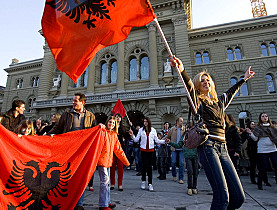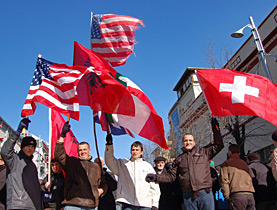Swiss one step closer to recognising Kosovo

Key committees from the two chambers of Swiss parliament have given their seal of approval to recognising Kosovo as an independent state.
The foreign affairs committee of the House of Representatives on Friday followed the lead of the Senate committee in recommending that cabinet recognise the independence of the former Serb province.
But the House of Representatives committee, which voted 15 to ten in favour of recognition, advised that the government find a way to do this without offending Serbia.
Announcing its decision, the committee’s speaker Geri Müller said it had considered the risk of a domino effect for separatist movements in other regions.
The committee also looked closely at the principle of neutrality and concluded that there was no danger to Switzerland’s neutrality. It consulted with international law experts on the validity of the independence declaration but their opinions differed.
Rather than limit itself to a simple recommendation, the committee called on the government to act for the protection of the Serb minority in Kosovo through its liaison office in Pristina.
Five days after unilaterally declaring independence from Serbia, more than 20 countries have recognised Kosovo – including the United States, Britain and France – and many more say they are planning to do so in the future.
Committee member Christa Markwalder said that Switzerland should not be among the last to recognise the new state, bearing in mind the community of up to 200,000 Kosovars living here.
She said that this was important for Switzerland to preserve its influence on the ground and help protect the Serbian minority.
Cabinet to decide
Now that the two parliamentary committees have made their position known, cabinet will decide on the issue in one of its upcoming weekly meetings. It asked the two parliamentary committees to give an opinion on the matter.
On Thursday, the Senate committee voted seven to four in favour of recognising the former Serb province.
But the speaker of the Senate committee, Dick Marty, warned against a hasty move on recognition. He also said that the Swiss foreign minster’s open support of independence had been a mistake.
“I have never understood why foreign minister Micheline Calmy-Rey spoke out in favour of Kosovo’s independence two years ago,” Marty said in a newspaper interview.
“She probably did not consult the cabinet beforehand and certainly not parliament,” Marty added. “In any case we annoyed the Serbs, with whom we are cultivating special relations.”
Worldwide, the response to Kosovo’s declaration of independence often has as much to do with history and local politics as it does with feelings of solidarity for Kosovo and its people.
Observers say mounting violence and Russia’s fierce opposition could push undecided states to shy away from recognising Kosovo, or delay their timetables for naming ambassadors and opening consulates in the breakaway statelet.
swissinfo with agencies
Kosovo has been run by the United Nations, backed by Nato troops, since the alliance’s 1999 bombing campaign to end a Serb crackdown on ethnic Albanian separatists.
The 90% Albanian majority reject return to Serb rule. Newly elected leaders of the province unilaterally declared independence on Sunday, February 12. The EU is due to take over supervision of the territory from the UN.
Switzerland is not part of the group of nations – Germany, the US, France, Britain, Italy and Russia – that were attempting to determine the fate of Kosovo, but it has been actively involved in the debate.
Up to 220 Swiss soldiers are deployed as part of the multinational Kosovo Force (Kfor). An additional 50 peacekeepers can be sent to the province for stints lasting up to two months in the case of a deteriorating situation.
The mandate of this Swisscoy force was extended to 2011 by the Swiss government in December last year.

In compliance with the JTI standards
More: SWI swissinfo.ch certified by the Journalism Trust Initiative











You can find an overview of ongoing debates with our journalists here . Please join us!
If you want to start a conversation about a topic raised in this article or want to report factual errors, email us at english@swissinfo.ch.